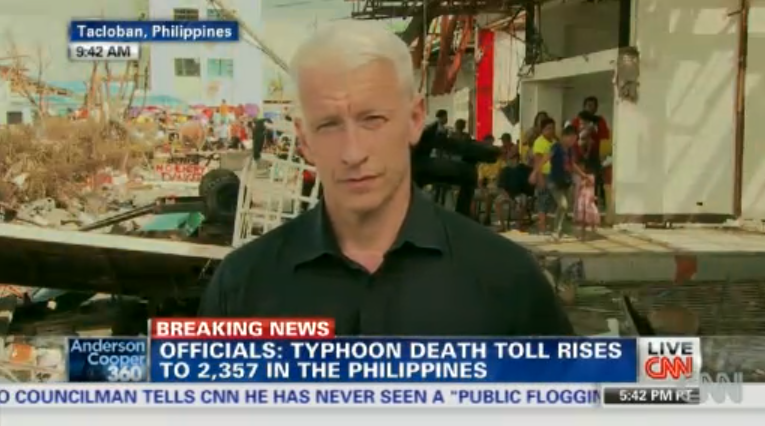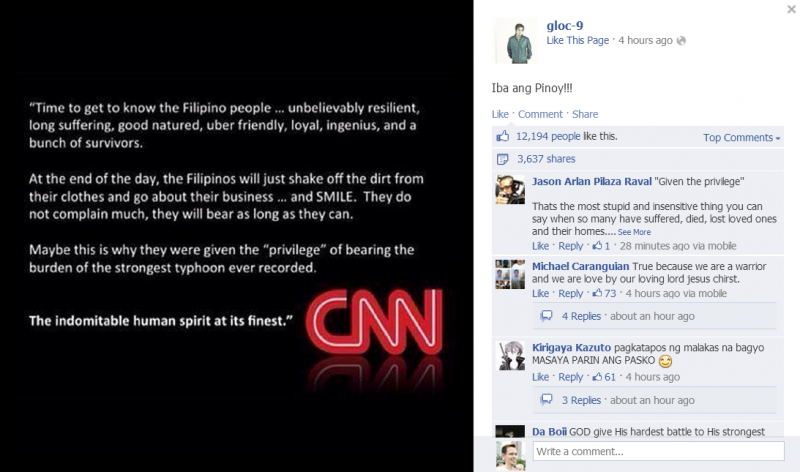Why CNN is Getting Praise and Flak for its Philippine Storm Coverage
CNN was among the first global media teams which arrived in the Philippines to cover the destruction left behind by super typhoon Haiyan (Yolanda). Many Filipinos recognized the extensive reporting made by CNN during and after the storm hit the central part of the country.
Wow! @CNN has great coverage of the Super Typhoon Haiyan/Yolanda than local news. I wasn't worried till I switched the channel to CNN! :(
— Frances Amper Sales (@FrancesASales) November 9, 2013
Thank you @CNN for the great #Haiyan/#Yolanda coverage! The Philippines is glued to you.
— Emilio (@13thFool) November 9, 2013
Many also appreciated the arrival of CNN anchor Anderson Cooper who reported live from Tacloban City, the ground zero of the disaster.
I'd rather believe those people on the field like @andersoncooper than those inside the news room
— Mei Lamamigo (@iloveMEIself) November 13, 2013
@andersoncooper, when journalists like you keep watch/notice, there's a bigger chance that most relief donations will reach Yolanda victims.
— Tinay VCS (@tin_tangkad) November 13, 2013
Anderson cited the complaints of survivors about the slow delivery of relief and other forms of assistance from the government. Filipino journalist Gel Santos Relos believes Anderson was objective in his reporting:
I personally think Anderson and the reporters and experts have been objective in the way they have covered the situation in Leyte — pointing out the intensity and magnitude of Yolanda, the effect of storm Zoraida on relief operations, the challenges brought about by geography, etc.
CNN is not there to “demolish” the image of the Philippines. They are in fact helping our kababayans by reporting things as they see them, so the international community can respond accordingly.
But her colleague and media personality Korina Sanchez disagreed. She reportedly criticized Anderson in her radio show:
Itong si Anderson Cooper, sabi wala daw government presence sa Tacloban. Mukhang hindi niya alam ang sinasabi niya.
This Anderson Cooper, he said there is no government presence in Tacloban. It seems he doesn’t know what he is saying.
Many reacted strongly against Korina and accused her of being comfortable in a Manila office in contrast to the ground reporting of Anderson. The following day, Korina travelled to Ormoc City (another badly hit town of Leyte province) where she reported about the situation of typhoon victims.
Apparently, Anderson heard about the criticism of Korina. He defended the accuracy of his report and invited Korina to go to Tacloban:
Ms Sanchez is welcome to go there and I would urge her to go there. I don’t know if she has but her husband’s the Interior minister. I’m sure he can arrange a flight
Anderson was correct when he pointed out that Korina is the wife of Mar Roxas, the secretary of the Department of the Interior and Local Government and head of the ruling Liberal Party. Netizen reactions were mostly in favor of Anderson.
Meanwhile, Yasmin Arquiza cautions the public not to immediately accept reports made by ‘parachute journalists’:
The problem in reporting a disaster of this magnitude, stretching across a string of islands hundreds of kilometers apart from east to west, is that the stories often resemble the tale of the six blind men and the elephant – depending on who's touching which part of the animal, you'll get a different description each time. Most of the images have been distressing, and it's often hard to tell if the reports from parachute journalists – we haven't seen this many since the days of coup d'etats in these parts – are mostly anecdotal or very much reflective of the reality in the field, given the tendency of foreign correspondents to generalize situations at times.
Anderson Cooper's coverage of the haiyan disaster in tacloban is a good example of parachute journalism and scaremongering.
— cebulog (@jdlctalk) November 16, 2013
Criticism should continue against the government’s slow relief operations, writes Professor Gerry Lanuza:
Without CNN Anderson Cooper's criticism of relief operation, Korina Sanchez would have not gone to Tacloban; without the victims complaining themselves, the government would have continued its failed response, without the vigilance and criticism against government bureaucracy the relief good would have been hijacked and used for political purposes.
Law professor Florin Hilbay tweets this reminder to reporters
regardless of whose side you're on, the journalist should not be the news. http://t.co/QwIqKP21zj
— florin hilbay (@fthilbay) November 15, 2013
Ayee Macaraig writes about the mixed reactions in the Philippines about the CNN coverage of the disaster:
CNN’s coverage of the typhoon has divided Filipinos on social media, with some praising the network for its extensive coverage and for calling out the Philippine government over the slow relief efforts. Others though criticized CNN for “parachute journalism” and for resorting to blaming the government instead of understanding the logistical problems involved.
Interestingly, there was a popular meme about the praise made by CNN about the ‘resiliency’ of Filipinos in the wake of the tragedy caused by Haiyan. But the ‘praise’ was actually a comment in a CNN article about the disaster.
Seekers Portal explains why many Filipinos believed in the ‘CNN photo’:
I believe that the reason why this “edited CNN photo” went viral was because, we Filipinos want to somehow alleviate the sufferings of our typhoon-and-earthquake-stricken countrymen, by sharing some encouragement.
But CNN did praise the Filipinos when Anderson left this message in his report yesterday:
They’re bowed perhaps, tired and traumatized, but they are not broken. Mabuhay Philippines, maraming salamat (thank you very much) for all you’ve shown us. Maraming salamat for showing us all how to live
As expected, Filipinos appreciated this remark
Because of the accurate report of Anderson Cooper, we filipinos were awakened of the real situation w/o bias. Thanks @CNN & @andersoncooper
— Angie G ♡ (@imSoooAngie) November 15, 2013
Meanwhile, some are not happy over the VIP treatment accorded by the government to the CNN news team. Some local media are accusing the office of the president of ‘babysitting’ CNN reporters.
via Global Voices » Feature http://globalvoicesonline.org/2013/11/17/why-cnn-is-getting-praise-and-flak-for-its-philippine-storm-coverage/
Labels: Global Voices » Feature, IFTTT



0 Comments:
Post a Comment
<< Home